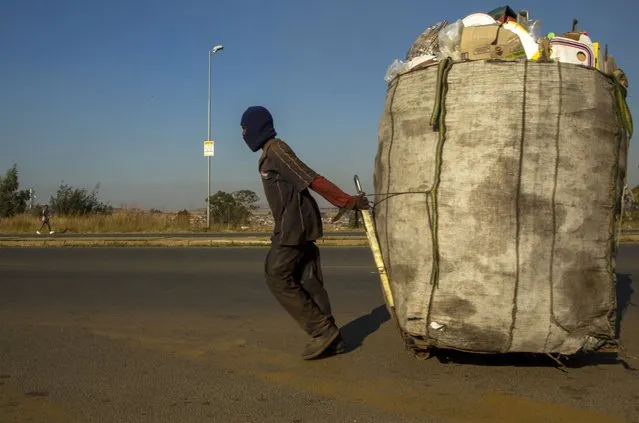
A man pulls a trolley filled with cardboard and plastic bottles for recycling through the streets at Phumlamqashi informal settlement near Johannesburg, South Africa, Wednesday, June 3, 2020. (Photo by Themba Hadebe/AP Photo)
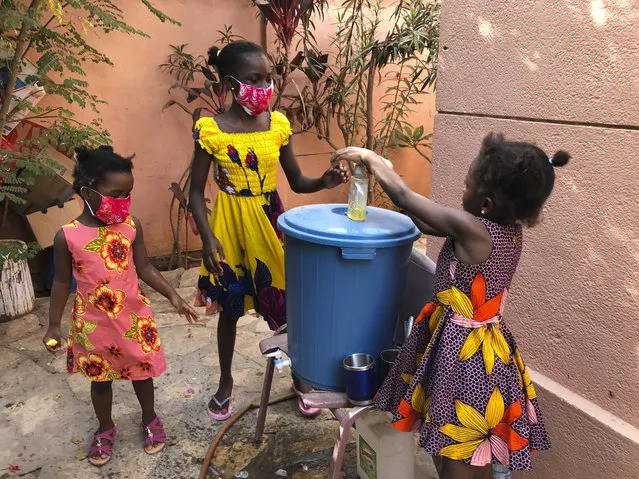
In this May 21, 2020, photo, the Larson sisters wash their hands inside the gate at their home in Dakar, Senegal. The girls were adopted from Sierra Leone after their father and other relatives died of Ebola. (Photo by Krista Larson/AP Photo)
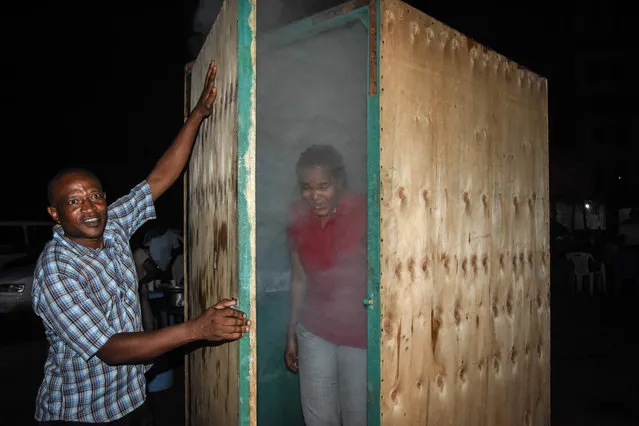
A woman leaves the steam inhalation booth installed by Tanzanian herbalist Msafiri Mjema in Dar es Salaam, Tanzania, on May 22, 2020 after using the treatment as a preventive measure against COVID-19 coronavirus. People willing to undergo the treatment will pay 1000 Tanzanian shillings (about less than a half a US dollar) to enter the booth, and inhale vapours of water and salt, for 5 to 10 minutes. Steam inhalations are a popular traditional treatment for flu, high fever, and malaria. Tanzania’s President John Magufuli said that one of his children had contracted COVID-19 coronavirus and had recovered thanks to steam inhalations using lemons and ginger. (Photo by Ericky Boniphace/AFP Photo)
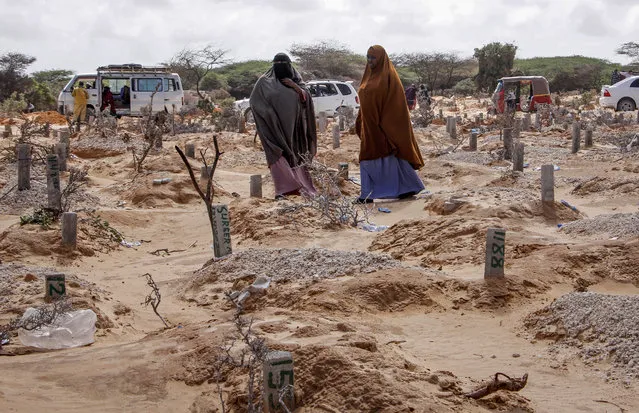
In this photo taken Wednesday, May, 13, 2020, women walk past graves at a cemetery in Mogadishu, Somalia, following the burial of a man who died of coronavirus. Years of conflict, instability and poverty have left Somalia ill-equipped to handle a health crisis like the coronavirus pandemic. It’s uncertain how many cases of COVID-19 are in Somalia. (Photo by Farah Abdi Warsameh/AP Photo)
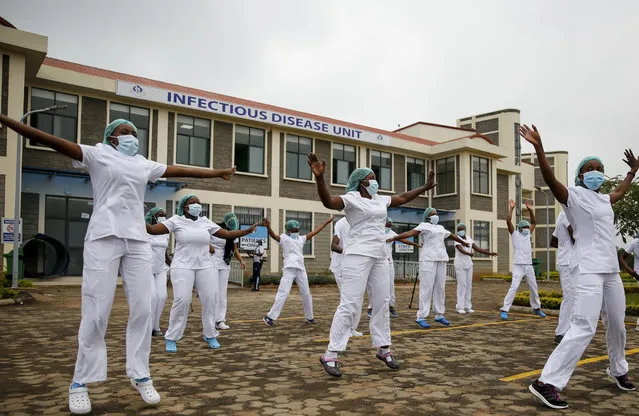
Nurses who take care of coronavirus patients at the infectious disease unit take part in a Zumba dance-fitness class put on to help them deal with the stress and difficult work, in the car park outside of the Kenyatta University Teaching, Referral and Research Hospital in Nairobi, Kenya Sunday, May 17, 2020. (Photo by Brian Inganga/AP Photo)
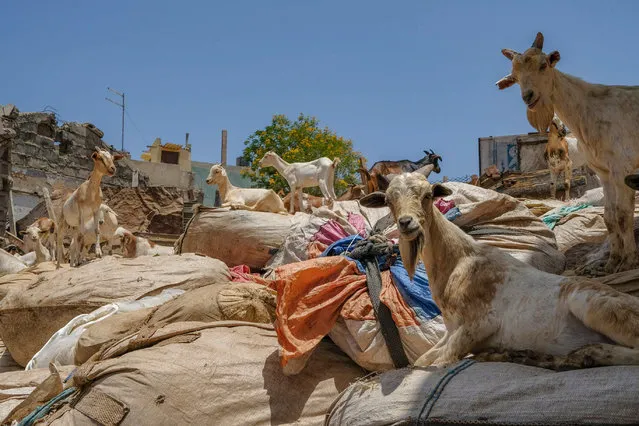
The Muslim population of Dakar, Senegal prepare the Korite (Eid-El-Fitr), the Muslim holiday marking the breaking of the fast of the month of Ramadan on May 21, 2020. (Photo by Sadak Souici/Le Pictorium Agency via ZUMA Press/Rex Features/Shutterstock)
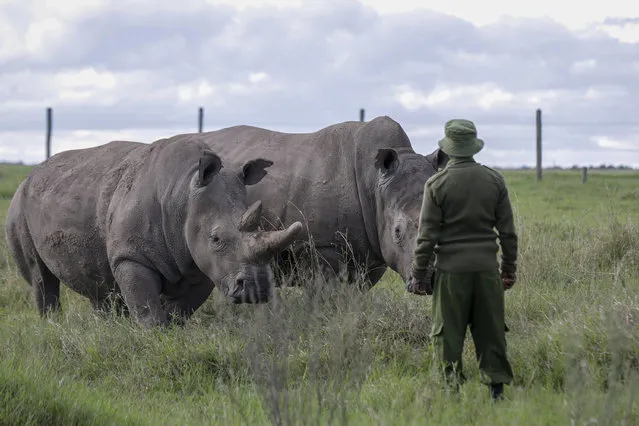
In this photo taken Friday, May 1, 2020, a ranger observes the last remaining two northern white rhinos Fatu, left, and Najin, right, at the Ol Pejeta conservancy in Kenya. The COVID-19 pandemic has brought a new alertness to anti-poaching patrols in Africa, and a new fear: With no tourist revenue coming in poachers might try to take advantage and protecting endangered wildlife has become that much more challenging. (Photo by Khalil Senosi/AP Photo)
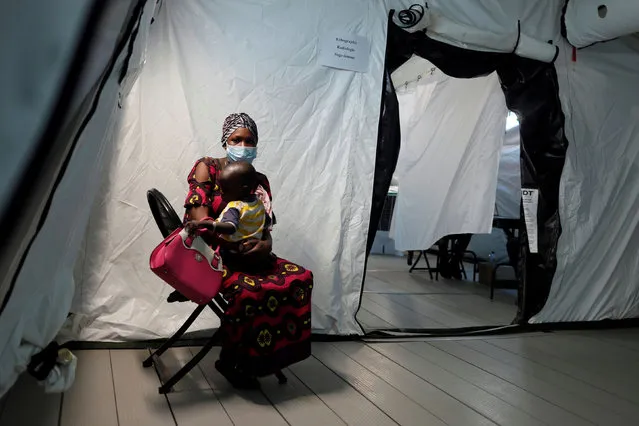
A woman holds her child as she waits for examination at the army field hospital, amid the outbreak of the coronavirus disease (COVID-19) in Touba, Senegal on May 1, 2020. (Photo by Zohra Bensemra/Reuters)
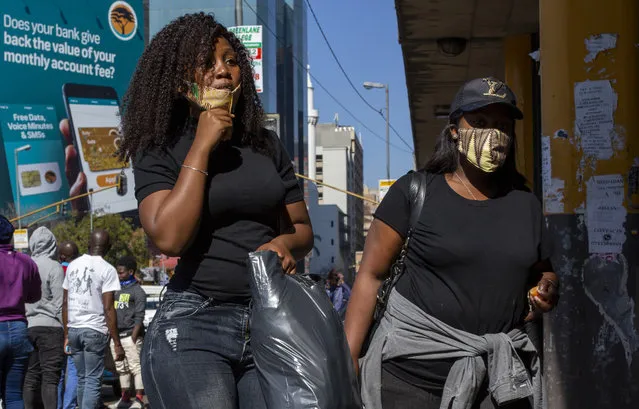
People wearing face masks to protect against coronavirus, walk on the street in downtown Johannesburg, South Africa, Monday, May 11, 2020. (Photo by Themba Hadebe/AP Photo)
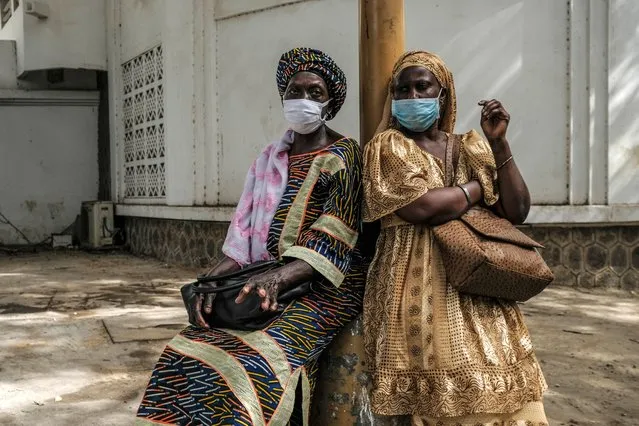
Women wearing face masks wait for a taxi in Dakar, Senegal, May 12, 2020. Senegal on Wednesday reported 110 new confirmed cases of COVID-19, bringing the total number to 2,105 in the country. (Photo by Xinhua News Agency/Rex Features/Shutterstock)
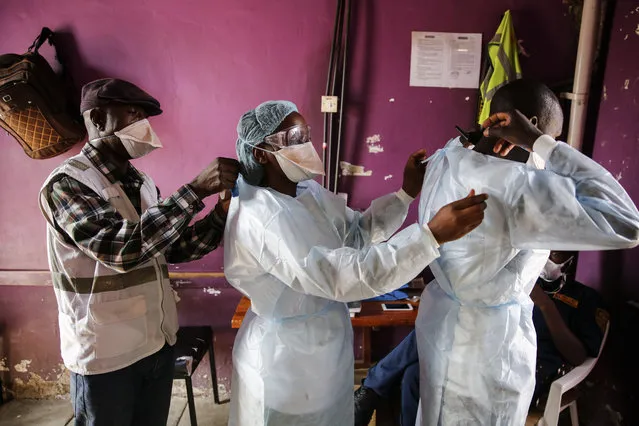
Medical staff aid each other to put on protective equipment as a precaution before dealing with patients with non-coronavirus related issues at the Medecins Sans Frontieres (Doctors without Borders) clinic in the Mathare slum, or informal settlement, of Nairobi, Kenya Thursday, May 28, 2020. According to MSF, measures being taken to curb the spread of the coronavirus such as a nightly curfew and transport restrictions, shortages of protective equipment, and the risk of contamination, are causing disruption to the provision of general health services in the low-income neighborhood. Some of these include the closure of private clinics and an unwillingness by others to admit patients with respiratory issues caused by tuberculosis, asthma or pneumonia. (Photo by Brian Inganga/AP Photo)
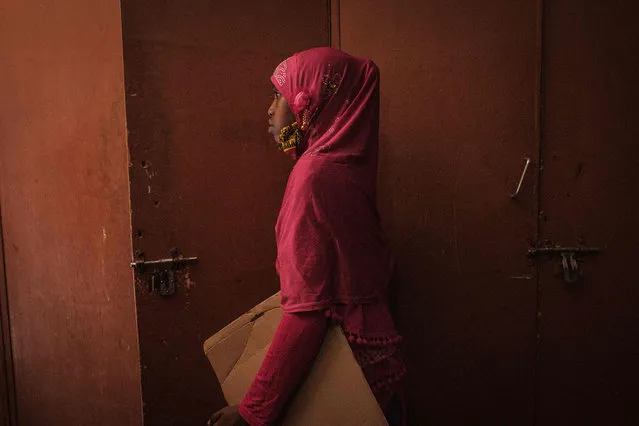
An orphan reacts during the food and toy distribution, for total about 500 orphans in 11 orphanages, by National Muslim COVID-19 Response Committee to celebrate Eid al-Fitr, the Muslim holiday which marks the end of the fasting month of Ramadan at the Mama Fatuma Goodwill Children's Home in Nairobi, Kenya, on May 25, 2020. (Photo by Yasuyoshi Chiba/AFP Photo)
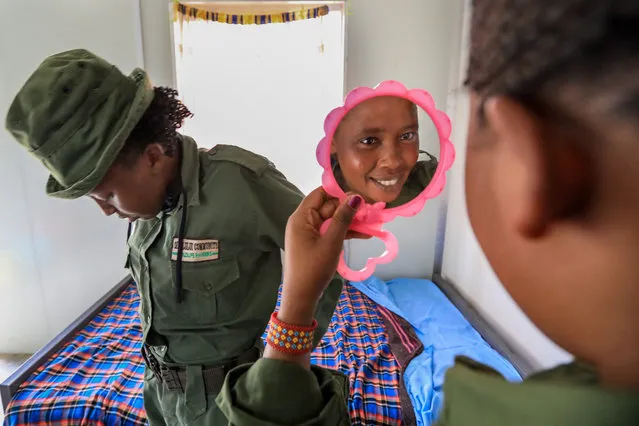
Eunice Peneti (R), 28, a former athelete and one of the eight members of the first Kenyan female Maasai community ranger’s unit known as 'Team Lioness', has a final look into the mirror prior to go on patrol within the Olulugului-Olareshi group ranch, an expansive area of traditional Maasai community land in Amboseli, Kajiado, Kenya, on 16 May 2020. The female rangers are part of a total of 76 community rangers who are financed by the International Fund for Animal Welfare (IFAW), and patrol a route of at least 20 kilometres every day to look out for any illegal activity or injured animals as a way of preventing poaching and reducing human wildlife conflict. Their patrol area is part of the 607 square kilometres of communal land around Amboseli National Park in visual range of Mount Kilimanjaro in Tanzania, the highest peak in Africa. The park is also a passageway for thousands of elephants in the middle of Maasai land. Due to the COVID-19 coronavirus pandemic, the lioness team members have not been able to go home since early March 2020 and the team has been living in their camps as a preventive measure to stop the spread of the virus and from contracting the virus. The closure of borders and the threat of the coronavirus has emptied the Kenyan parks, the main tourist attraction in the country, affecting also the Maasai communities that are highly depending on their income from the tourism – either in formal jobs, by selling small jewels to tourists or even by a small fee from tourists visiting their 'boma', the circular mud house villages where most of this ethnic group live. The IFAW funded rangers had to increase their patrols to ensure that poachers do not exploit any gaps that may arise leading to an increase in poaching. (Photo by Daniel Irungu/EPA/EFE)
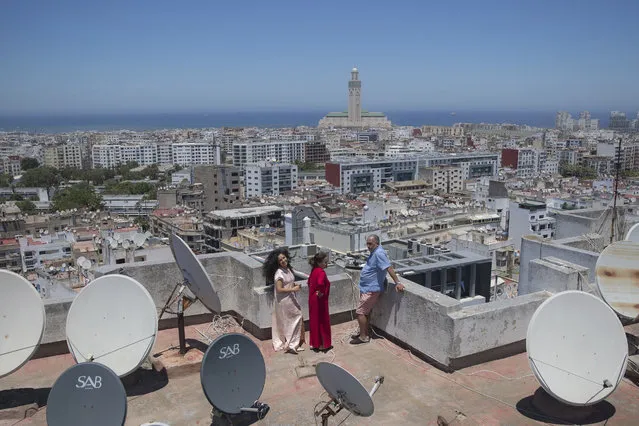
Yousra Sandabad, left, and her parents, Moustafa and Afifa, go out for some fresh air on their rooftop on the first day of Eid in lockdown due to the Coronavirus pandemic, in Casablanca, Morocco, Sunday, May 24, 2020. (Photo by Mosa'ab Elshamy/AP Photo)
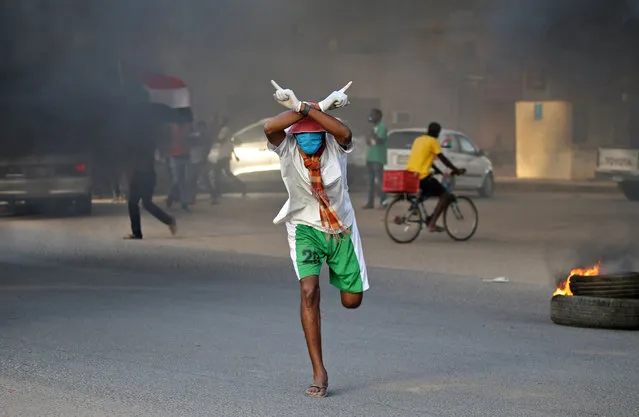
A Sudanese protester clad in mask and latex gloves runs during a demonstration marking the first anniversary of a raid on an anti-government sit-in, in the Riyadh district in the east of the capital Khartoum on June 3, 2020. Scores of protesters were killed when armed men in military fatigues stormed the sprawling encampment outside Khartoum's army headquarters on June 3 last year. (Photo by Ashraf Shazly/AFP Photo)

An orphan plays with her new hula hoop during the food and toy distribution, for total about 500 orphans in 11 orphanages, by National Muslim COVID-19 Response Committee to celebrate Eid al-Fitr, the Muslim holiday which marks the end of the fasting month of Ramadan at Good hope markazil Banatil Islamia orphans centre in Nairobi, Kenya, on May 25, 2020. (Photo by Yasuyoshi Chiba/AFP Photo)
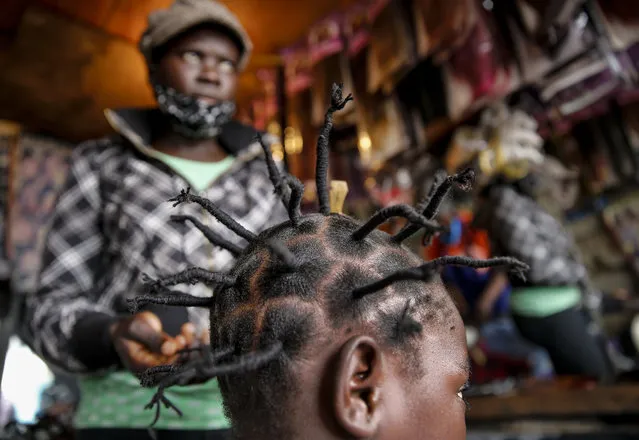
In this Sunday, May 3, 2020 file photo, Gettrueth Ambio, 12, has her hair styled in the shape of the new coronavirus, at the Mama Brayo Beauty Salon in the Kibera slum, or informal settlement, of Nairobi, Kenya. The coronavirus has revived a hairstyle in East Africa, one with braided spikes that echo the virus' distinctive shape, with the growing popularity in part due to economic hardships linked to virus restrictions. (Photo by Brian Inganga/AP Photo/File)
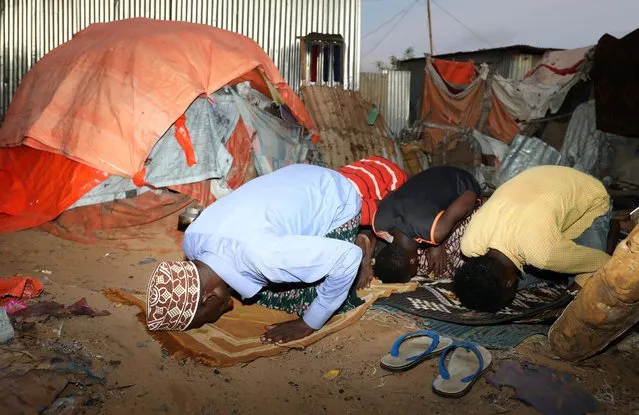
Internally displaced Somali men perform prayers after Iftar (breaking the fast) during the month of Ramadan at the Shabelle makeshift camp in Hodan district of Mogadishu, Somalia on May 8, 2020. (Photo by Feisal Omar/Reuters)
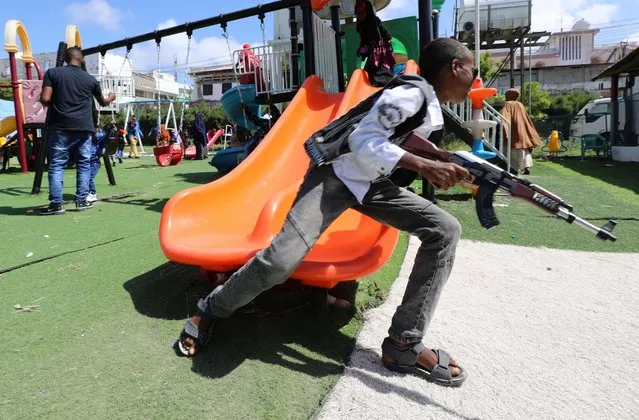
A Somali boy plays at the peace gardens after the Eid al-Fitr prayers, marking the end of the holy fasting month of Ramadan, amid concerns about the spread of the coronavirus disease (COVID-19), in Mogadishu, Somalia on May 24, 2020. (Photo by Feisal Omar/Reuters)
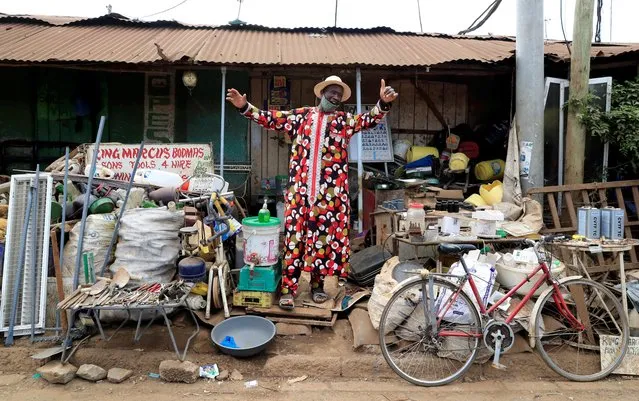
Ali Ibrahim Ambar, a trader, salutes Muslim faithful after performing the Eid al-Fitr prayers, marking the end of the holy fasting month of Ramadan, amid concerns about the spread of the coronavirus disease (COVID-19), in Nairobi, Kenya, May 24, 2020. (Photo by Thomas Mukoya/Reuters)
06 Jun 2020 00:01:00,
post received
0 comments
